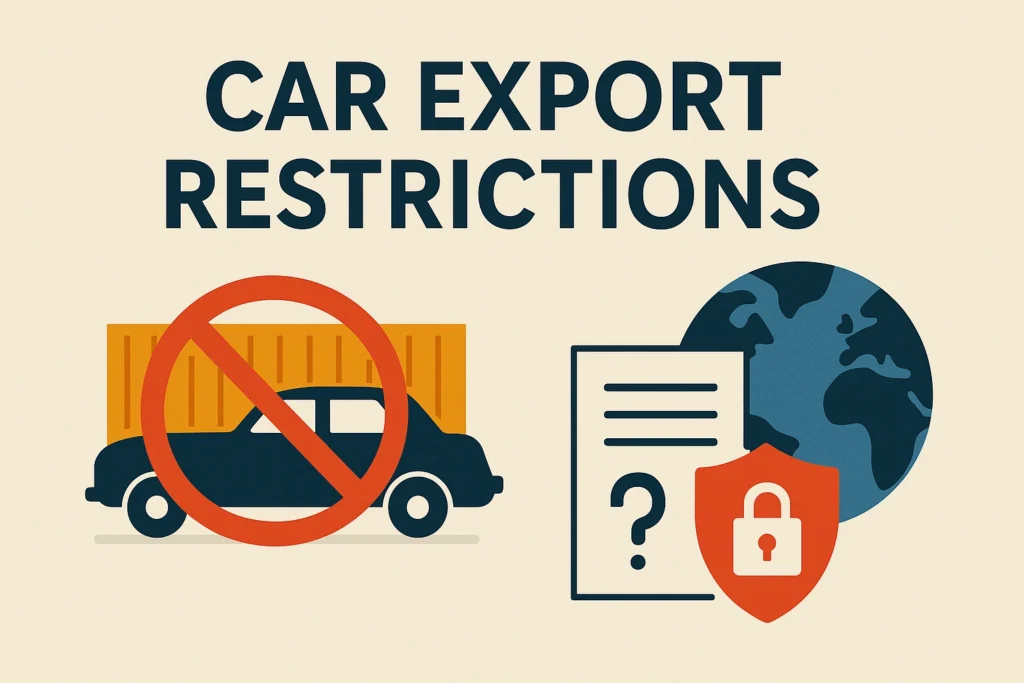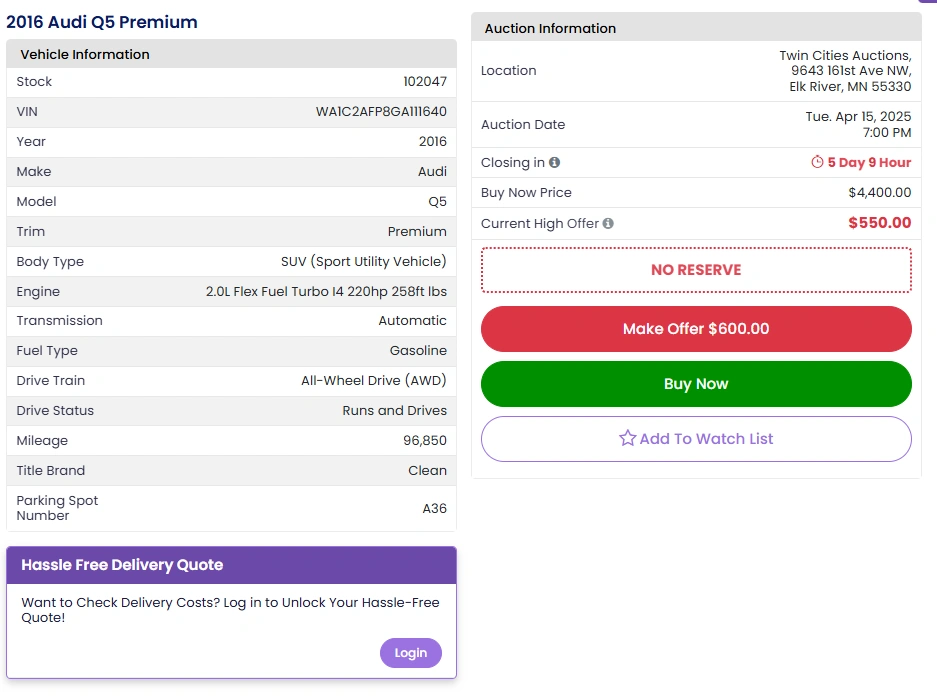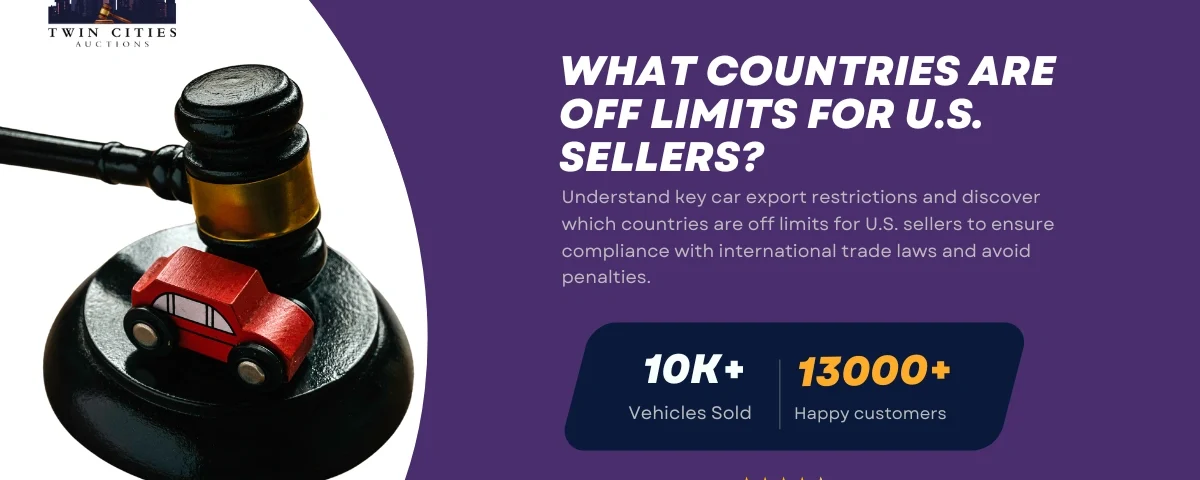In 2024 the Office of Foreign Assets Control (OFAC) assessed more than forty-eight million dollars in civil penalties, and a single shipment of machinery to a sanctioned entity cost one exporter over one million.
Vehicles can trigger the very same rules. One mis-shipped pickup may erase an entire year of profit and invite years of scrutiny.If you sell, flip, or broker U.S. vehicles for overseas buyers, you need more than a keen eye for bargains.
You must know where cars may not go, how the watch-lists work, and what paperwork proves you did everything right. This guide gives you a practical roadmap from first VIN check to final load-out.

Key Takeaways
- Cuba, Iran, North Korea, Syria, and Crimea are fully embargoed
- Russia and Belarus require an export license for every vehicle
- Civil fines reach $300 000 per violation; criminal fines reach $1 million
- Screen every buyer and logistics partner before money changes hands
- Twin Cities Auctions simplifies titles, documents, and export paperwork
Why Export Restrictions Exist
Three federal outfits keep a close eye on outbound cargo:
- The Office of Foreign Assets Control (OFAC) enforces sanctions that advance U.S. security and foreign-policy goals.
- The Bureau of Industry and Security (BIS) administers the Export Administration Regulations, which control dual-use goods and certain luxury items.
- U.S. Customs and Border Protection (CBP) verifies that licenses, filings, and cargo match before a ship departs.
Collectively they aim to stop money-laundering, weapons proliferation, and the financing of regimes that violate human rights.
How Sanctions Lists Work
- Specially Designated Nationals (SDN) list
A do-not-deal roster of people, companies, and vessels. Any transaction with an SDN without a specific license is prohibited. - Non-SDN lists
Secondary lists that apply narrower rules, such as the Foreign Sanctions Evaders List. - EAR Country Groups
BIS divides destinations into groups A through E. Group E faces a near-total embargo; Group D requires licenses for most controlled items. - Comprehensive embargo vs. targeted sanctions
A comprehensive embargo blocks nearly every transaction with an entire country or territory. Targeted sanctions focus on specific sectors or named parties.
Countries Completely Off Limits
The destinations below require a rarely granted specific license to receive any U.S. motor vehicle.
A country description precedes the summary table for quick reference.
Vehicles may not legally be shipped to Cuba, Iran, North Korea, Syria, or the Russian-occupied regions of Ukraine. These locations fall under Group E of the EAR, and license applications face a policy of “presumption of denial.”
| Destination | Sanctions Program | Primary Reason |
| Cuba | Cuba regulations | Human-rights and democracy concerns |
| Iran | Iran regulations | Nuclear-proliferation and terrorism financing |
| North Korea | DPRK regulations | Missile and nuclear programs |
| Syria | Syria regulations | Civil-war atrocities and terror support |
| Crimea, Donetsk, Luhansk, Kherson, Zaporizhzhia | Ukraine-related | Russian occupation of Ukrainian territory |
High-Risk or Partially Restricted Destinations
Some countries are not fully embargoed, yet exporting a car still takes additional effort.
- Russia and Belarus – every item on the Commerce Control List now needs a license, including ordinary sedans and SUVs.
- Venezuela – transactions with state-owned or blocked entities require a BIS license.
- Myanmar, Sudan, Zimbabwe – heightened review applies when regime-linked parties appear in the chain.
No current license exception covers a complete motor vehicle headed for any of these destinations. Assume you need formal approval unless BIS states otherwise in writing.
Penalties for Violations
Civil penalties under the Export Control Reform Act can climb to three-hundred-thousand dollars per violation or twice the shipment’s value, whichever is higher. Criminal penalties can reach one million dollars per count plus up to twenty years in prison.
Below is a concise look at what is on the line.
| Offense Type | Civil Fine Ceiling | Criminal Fine Ceiling | Possible Prison Term |
| EAR violation | $300 000 or 2× value | $1 000 000 | Up to 20 yrs |
| OFAC violation | $368 136 per transaction (2025 cap) | $1 000 000 | Up to 20 yrs |
Compliance Checklist for Sellers
- Verify the VIN on title, bill of sale, and vehicle.
- Know your customer — run buyer and consignee through OFAC’s SDN search.
- Use the free Consolidated Screening List before issuing an invoice.
- Vet the freight forwarder — ask for a written compliance policy.
- File Electronic Export Information (AES) and keep the ITN for your records.
- Archive all documents — invoices, screenings, emails, and load-out photos — for at least five years.
Why Auctions Are a Smart Choice for Car Purchases
Auctions can be an excellent source for late-model vehicles with clear chains of title and affordable pricing. Twin Cities Auctions, based in Minnesota, is one such reputable auction house that offers a wide range of vehicles at competitive prices.
Key Benefits of Buying from Auctions:
- Wide Selection: Auctions like Twin Cities Auctions offer a variety of vehicles, from low-budget cars to high-end models.

- Competitive Pricing: Auctions often offer vehicles at prices below retail value, enabling dealers to maximize their profit margins.

- Transparency: Auctions provide full vehicle history reports, so you know exactly what you’re buying.

- Convenient Bidding: Many auctions offer online bidding for your convenience, making it easier to source vehicles without being physically present.
Twin Cities Auctions: A Smart Vehicle Sourcing Choice
For those in the automotive industry, Twin Cities Auctions offers an excellent platform for sourcing quality vehicles at competitive prices.
Whether you are just starting or expanding your business, this auction house provides transparency, competitive pricing, and a broad selection.
| Feature | Description |
| Inventory Variety | Wide range of cars, trucks, and SUVs available |
| Competitive Pricing | Below-market pricing allows for higher profit margins |
| Vehicle History Reports | Detailed history reports for every vehicle |
| Online Bidding | Convenient online bidding options for dealers |
| Financing Options | Financing available to help with inventory purchases |
Conclusion
Export compliance is not optional. Cuba, Iran, and other embargoed destinations are entirely off limits, while Russia and several high-risk countries demand advance licenses.
Fines can dwarf the value of any car you hope to sell, yet a disciplined screening routine keeps risk low. When sourcing inventory, reputable auctions such as Twin Cities Auctions provide verified titles and export-ready documents that help you stay on the right side of every rule.
Find Your Next Ride Online at Twin Cities Auctions—No Dealer License Required
Searching for your next vehicle? Twin Cities Auctions offers an online, transparent car auction experience that’s accessible to everyone, no dealer license needed. Browse and bid on a diverse selection of quality vehicles from the comfort of your home.
Whether you’re a first-time buyer or an experienced trader, our clear, honest bidding process ensures you can make informed decisions in a supportive environment. Join our next online auction and discover how effortless and enjoyable finding your next car can be with Twin Cities Auctions!
Looking for more options? Explore our comprehensive list of all available car auctions across the United States. Your next deal might be just a click away!
FAQ
What qualifies a destination as embargoed?
A country becomes embargoed when U.S. regulations prohibit nearly all transactions with its government, companies, and residents. Cuba, Iran, North Korea, Syria, and Crimean territories fall into this category.
Do I need a BIS license to ship a car to Mexico?
Most passenger vehicles qualify for No License Required status, but you must file Electronic Export Information and screen every party involved.
How long should I keep export records?
Regulations require at least five years from the date the vehicle leaves U.S. jurisdiction. Many exporters keep digital archives for seven years.
Can I finance a vehicle with a salvage title for export?
Most lenders avoid salvage titles. Financing is more common after the vehicle is rebuilt and rebranded, but export lenders still review destination-country rules.
Source Links
https://ofac.treasury.gov/sanctions-programs-and-country-information
https://www.bis.doc.gov/index.php/policy-guidance/country-guidance/sanctioned-destinations
https://www.ecfr.gov/current/title-22/chapter-I/subchapter-M/part-126/section-126.1
https://researchservices.cornell.edu/resources/export-controls-frequently-asked-questions-faq
https://www.exim.gov/resources/country-limitation-schedule
https://en.wikipedia.org/wiki/Export_Administration_Regulations


